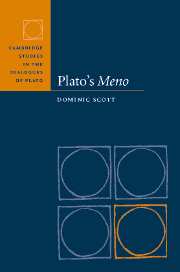Book contents
- Frontmatter
- Contents
- Acknowledgements
- Introduction
- Part I
- Chapter 1 The opening: 70a–71d
- Chapter 2 The first definition: 71e–73c
- Chapter 3 A lesson in definition: 73c–77b
- Chapter 4 The third definition: 77b–79e
- Chapter 5 Meno as an interlocutor
- Part II
- Part III
- Conclusion
- Appendices
- References
- Index of ancient passages
- General index
Chapter 2 - The first definition: 71e–73c
Published online by Cambridge University Press: 29 September 2009
- Frontmatter
- Contents
- Acknowledgements
- Introduction
- Part I
- Chapter 1 The opening: 70a–71d
- Chapter 2 The first definition: 71e–73c
- Chapter 3 A lesson in definition: 73c–77b
- Chapter 4 The third definition: 77b–79e
- Chapter 5 Meno as an interlocutor
- Part II
- Part III
- Conclusion
- Appendices
- References
- Index of ancient passages
- General index
Summary
SOCRATES VERSUS GORGIAS
Meno is surprised at Socrates' claim not to know what virtue is, and no less surprised that he has never met anyone else who does:
Men. What? Didn't you meet Gorgias when he was here?
Soc. I did.
Men. Then didn't he seem to you to know?
Soc. I don't have a very good memory, Meno. So I can't say now how he seemed to me then. But perhaps he did know, and you know what he said. So remind me what he said. But if you'd rather, speak on your own behalf: I imagine you think the same as he does.
Men. I do.
Soc. So let's leave him aside, as he's not here anyway. But you, Meno, by the gods, what do you say virtue is? Speak and don't begrudge me an answer. Maybe it'll transpire that I was telling a most fortunate falsehood, if you and Gorgias turn out to know, while there was I saying I'd never met anyone who did.
(71c5–d8)Socrates has now set the stage for Meno to give a definition of virtue and, in doing so, continues to draw out one of the central themes of his initial speech: Meno is positioned as someone who will be recalling views enunciated by Gorgias. This exchange also continues the proleptic technique of the previous lines: the references to memory (71c8 and c10) playfully anticipate the most famous theme of the dialogue.
- Type
- Chapter
- Information
- Plato's Meno , pp. 23 - 30Publisher: Cambridge University PressPrint publication year: 2006
- 1
- Cited by



